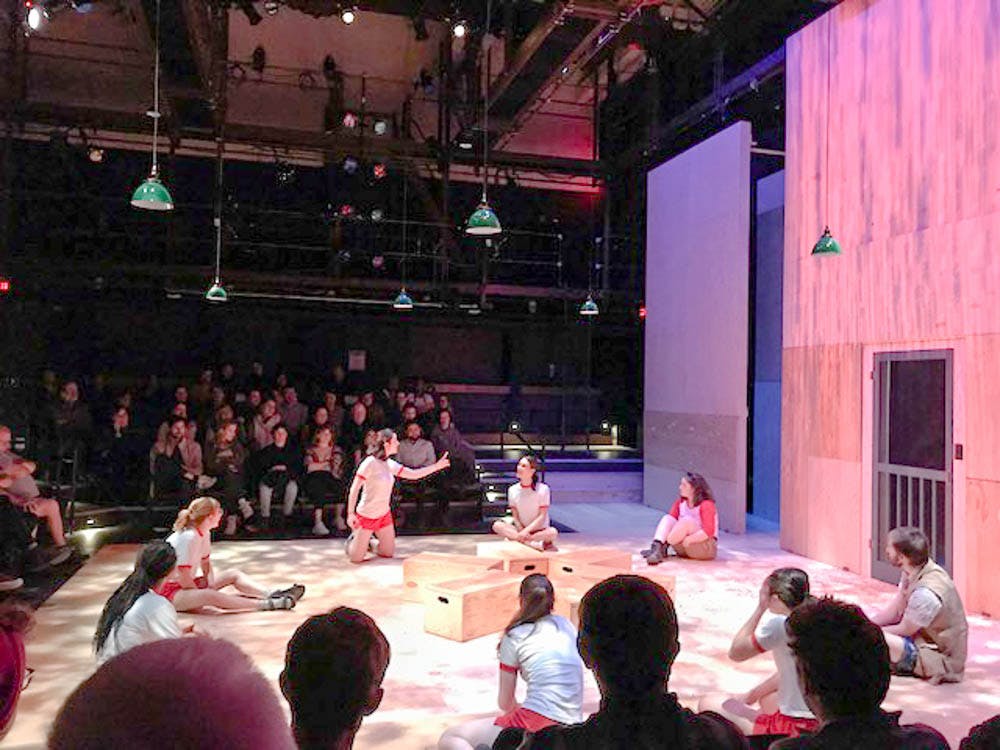On the evening of Oct. 31, audience members crowded into Leeds Theatre to see the debut of “kemps,” an absurdist experimental play written by Emma Horwitz ’20 MFA and directed by Josiah Davis ’20 MFA.
Following the story of five teen girls sharing a bunk at a summer camp, the theatrical piece mixes 2000s pop culture with heartfelt narratives, recounting how young women navigate their identities with the support of other women.
According to the show program, “kemps is a card game played with two teams of two ... (that) requires a series of secret signals to be determined before play – small gestures, coughs, brushes of hair, a grunt.” Inspired by this card game that she played obsessively during her own teenage summer camp experience, Horwitz wanted to mimic the feeling of playing kemps – the tacit understanding between partners – without directly referencing the game.
“The play is about these sort of inexplicable and emotional moments in our lives when we might not have the language to describe how we’re feeling ... but (we are) still wanting to be able to have somebody to communicate that to,” Horwitz said.
In the plot of the play, Jenna, Len, Cassie and twins Rachel and Carrie attend the same summer camp in the pinewoods of the Poconos every year. Coming from different parts of the country, they always return to camp and find everything exactly as they had left it the summer before: the bunks, their favorite camp manager named Z and their friendships from the previous summers. But this year, some things have changed: The head of camp has been replaced by his son, Len, and the arrival of two newcomers, Sam and K, affects the dynamic of the friend group. Despite the tension these changes create, the girls ultimately support one another and embrace all of the messiness and chaos of transitioning into womanhood.
“What I really wanted to do in this project was to create a play about young women that wasn’t about competition, but about collectivity and about working together and about expression,” Horwitz explained.
David Kleinman ’20 understands his character of Len as somewhat of a villain. Len “is definitely the outsider. ... But also, he doesn’t really know how this place works, and he wants to help the camp. ... It’s all out of love.” Even the play’s supposed antagonist ultimately holds good intentions for the community of the camp.
Sarah Lewis ’23, who starred as the closeted lesbian teen Rachel, expressed her excitement to act in an original play for the first time. Interested in both acting and playwriting, Lewis reflected on how this experience allowed her to see both sides of the playmaking process as well as how an actor can “help shape the way the play ends up being written.”
Lip syncs and comedic dances interspersed the various coming-of-age narratives within the larger plot. Horwitz integrated some lip sync performances into the storyline, such as in the final camp showcase. In other instances of lip sync that even occurred in the middle of conversations, she relied on the audience’s suspension of disbelief for those stylistic decisions to fit within the logic of the play. Indeed, audience members laughed heartily along as the performers passionately moved their mouths to iconic pop songs.
Horwitz explains her use of lip sync in the play as a method to reference queerness, “paying homage to this underground art form that was developed by queer people in unlikely spaces. … Every time I watch a lip sync on RuPaul’s drag race, I think about the emotional fervor of a young woman, ... and I sort of wanted to take this queer mode of performance and have young women enact it.”
Considering the goals of the project, Horwitz cited inspiration to give “voice to women to be messy and complicated and unusual creatures.” Ultimately, “kemps” explores “how we grapple with being women in life and how we grapple with depicting what it means to be a woman onstage.”





